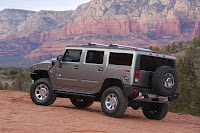
Wouldn't it be something if the candidates displayed this much insight into the massive problems now battering America and addressed the following points squarely and honestly while campaigning? Please read the following op/ed piece to reference what I'm talking about.
*****
Wake Up, America. We're Driving Toward Disaster.
By James Howard Kunstler
Washington Post, Sunday, May 25, 2008
Everywhere I go these days, talking about the global energy predicament on the college lecture circuit or at environmental conferences, I hear an increasingly shrill cry for "solutions." This is just another symptom of the delusional thinking that now grips the nation, especially among the educated and well-intentioned.
I say this because I detect in this strident plea the desperate wish to keep our "Happy Motoring" utopia running by means other than oil and its byproducts. But the truth is that no combination of solar, wind and nuclear power, ethanol, biodiesel, tar sands and used French-fry oil will allow us to power Wal-Mart, Disney World and the interstate highway system -- or even a fraction of these things -- in the future. We have to make other arrangements.
The public, and especially the mainstream media, misunderstands the "peak oil" story. It's not about running out of oil. It's about the instabilities that will shake the complex systems of daily life as soon as the global demand for oil exceeds the global supply. These systems can be listed concisely:
The way we produce food
The way we conduct commerce and trade
The way we travel
The way we occupy the land
The way we acquire and spend capital
And there are others: governance, health care, education and more.
As the world passes the all-time oil production high and watches as the price of a barrel of oil busts another record, as it did last week, these systems will run into trouble. Instability in one sector will bleed into another. Shocks to the oil markets will hurt trucking, which will slow commerce and food distribution, manufacturing and the tourist industry in a chain of cascading effects. Problems in finance will squeeze any enterprise that requires capital, including oil exploration and production, as well as government spending. These systems are all interrelated. They all face a crisis. What's more, the stress induced by the failure of these systems will only increase the wishful thinking across our nation.
And that's the worst part of our quandary: the American public's narrow focus on keeping all our cars running at any cost. Even the environmental community is hung up on this. The Rocky Mountain Institute has been pushing for the development of a "Hypercar" for years -- inadvertently promoting the idea that we really don't need to change.
Years ago, U.S. negotiators at a U.N. environmental conference told their interlocutors that the American lifestyle is "not up for negotiation." This stance is, unfortunately, related to two pernicious beliefs that have become common in the United States in recent decades. The first is the idea that when you wish upon a star, your dreams come true. (Oprah Winfrey advanced this notion last year with her promotion of a pop book called "The Secret," which said, in effect, that if you wish hard enough for something, it will come to you.) One of the basic differences between a child and an adult is the ability to know the difference between wishing for things and actually making them happen through earnest effort.
The companion belief to "wishing upon a star" is the idea that one can get something for nothing. This derives from America's new favorite religion: not evangelical Christianity but the worship of unearned riches. (The holy shrine to this tragic belief is Las Vegas.) When you combine these two beliefs, the result is the notion that when you wish upon a star, you'll get something for nothing. This is what underlies our current fantasy, as well as our inability to respond intelligently to the energy crisis.
These beliefs also explain why the presidential campaign is devoid of meaningful discussion about our energy predicament and its implications. The idea that we can become "energy independent" and maintain our current lifestyle is absurd. So is the gas-tax holiday. (Which politician wants to tell voters on Labor Day that the holiday is over?) The pie-in-the-sky plan to turn grain into fuel came to grief, too, when we saw its disruptive effect on global grain prices and the food shortages around the world, even in the United States. In recent weeks, the rice and cooking-oil shelves in my upstate New York supermarket have been stripped clean.
So what are intelligent responses to our predicament? First, we'll have to dramatically reorganize the everyday activities of American life. We'll have to grow our food closer to home, in a manner that will require more human attention. In fact, agriculture needs to return to the center of economic life. We'll have to restore local economic networks -- the very networks that the big-box stores systematically destroyed -- made of fine-grained layers of wholesalers, middlemen and retailers.
We'll also have to occupy the landscape differently, in traditional towns, villages and small cities. Our giant metroplexes are not going to make it, and the successful places will be ones that encourage local farming.
Fixing the U.S. passenger railroad system is probably the one project we could undertake right away that would have the greatest impact on the country's oil consumption. The fact that we're not talking about it -- especially in the presidential campaign -- shows how confused we are. The airline industry is disintegrating under the enormous pressure of fuel costs. Airlines cannot fire any more employees and have already offloaded their pension obligations and outsourced their repairs. At least five small airlines have filed for bankruptcy protection in the past two months. If we don't get the passenger trains running again, Americans will be going nowhere five years from now.
We don't have time to be crybabies about this. The talk on the presidential campaign trail about "hope" has its purpose. We cannot afford to remain befuddled and demoralized. But we must understand that hope is not something applied externally. Real hope resides within us. We generate it -- by proving that we are competent, earnest individuals who can discern between wishing and doing, who don't figure on getting something for nothing and who can be honest about the way the universe really works.
James Howard Kunstler is the author, most recently, of "World Made by Hand," a novel about America's post-oil future.
*****
I can't say I'm totally convinced about the Peak Oil Theory just yet, but it is something that bears serious, substantive discussion. All I know is that current oil production is not meeting (and perhaps cannot meet) demand and that's cause for great concern.
Take care.
DAL357









